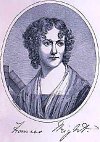|
|
 |
 |
|
Reading Guide |
| 6. |
Summing Up
| - | Frances ("Fanny") Wright, Views of Society and Manners in America, 1821, excerpts |
|
|
 |
We offer this text to frame your final discussion on the last day of the seminar— to revisit the themes of the week and to put your deliberations in perspective. It comes from a young Scottish woman who visited America in 1818-1820. Na´ve and blissful in her journeys, she portrays a nation almost without fault. So much so that James Fennimore Cooper panned her essays as "nauseous flattery." But Cooper was a notorious curmudgeon and, while his judgment is true at times, a fair analysis of Wright's piece acknowledges her insight and even foresight (in her later and less na´ve years she became an American activist for abolition and women's suffrage). From politics to race and religion, from economics to expansion, Fanny Wright's perspective deserves your consideration, and evaluation. Finally, it's a fun read and would entice students to revisit their view of America in 1820. 7 pages.
Discussion questions
| · |
What hopes, anxieties, and dilemmas voiced by republican leaders in the 1790s does Fanny Wright address? |
| · |
What does she offer from her perspective as a European? as a woman? |
| · |
How valid are her views on America in 1820?
|
» Link |
 |
 |
Topic Framing Questions
| • |
What notions of equality were held by early republican leaders? free black men? white women?
|
| • |
How did their notions of equality and rights correspond? |
| • |
How did each group mold its public voice? How did each use its power? |
| • |
To what extent did America succeed in "living the revolution" by 1820? |
|
|
 |
 |
|
 |
